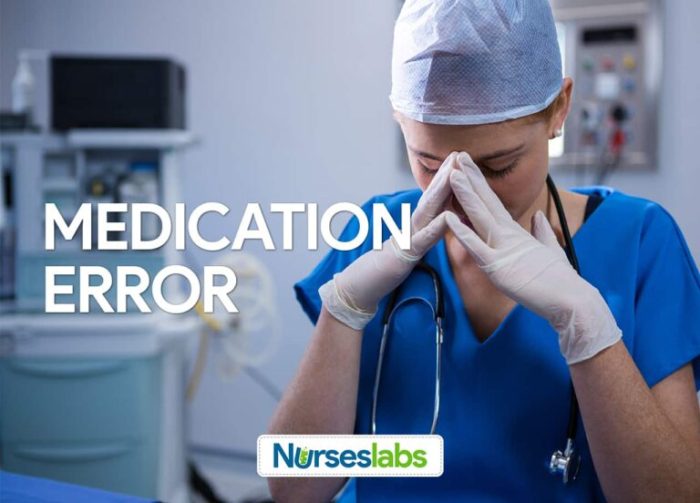A nurse accidentally administers the wrong medication to a client, a scenario that can have far-reaching consequences for both the patient and the healthcare professional involved. This incident highlights the critical importance of medication safety and the need for robust systems and practices to prevent such errors from occurring.
Medication errors, defined as any preventable event that may cause or lead to inappropriate medication use or patient harm while the medication is in the control of the health care professional, nurse, or patient, pose a significant threat to patient safety.
The World Health Organization estimates that medication errors account for approximately 1 in 10 hospital admissions and result in substantial morbidity and mortality.
Medical Error Investigation
Medication errors are a significant patient safety concern, necessitating a thorough investigation to identify the root cause and prevent future occurrences.
Steps in Medication Error Investigation
- Gather relevant information, including medical records, medication administration records, and witness statements.
- Review the medication administration process and identify any deviations from established standards.
- Interview involved healthcare professionals to obtain their perspectives and identify contributing factors.
- Analyze the data to determine the root cause of the error, which may include system failures, human factors, or medication-related issues.
Importance of Thorough Investigation
A thorough investigation is crucial to:
- Identify the root cause and prevent similar errors in the future.
- Protect patients from potential harm.
- Hold healthcare professionals accountable and ensure compliance with standards.
Impact on Patient Safety

Medication errors can have severe consequences for patients, including:
Potential Consequences
- Adverse drug reactions
- Delayed or ineffective treatment
- Hospitalization or prolonged recovery time
- Disability or death
Strategies for Minimizing Risk
To minimize the risk of medication errors, healthcare organizations can implement strategies such as:
- Using technology, such as computerized physician order entry (CPOE) and barcoding, to reduce manual errors.
- Establishing clear medication administration policies and procedures.
- Providing comprehensive training and education to healthcare professionals.
Nurse Accountability

Nurses have a primary responsibility in preventing medication errors. They are accountable for:
Responsibilities, A nurse accidentally administers the wrong medication to a client
- Verifying medication orders against patient records.
- Preparing and administering medications accurately.
- Monitoring patients for adverse drug reactions.
- Reporting medication errors promptly.
Professional Standards and Guidelines
Nurses must adhere to professional standards and guidelines, such as those established by the American Nurses Association (ANA) and the Joint Commission, to ensure safe medication administration.
Measures to Enhance Accountability
Healthcare organizations can enhance nurse accountability through measures such as:
- Providing regular performance evaluations.
- Encouraging open communication and reporting of errors.
- Implementing quality improvement initiatives.
Legal Implications: A Nurse Accidentally Administers The Wrong Medication To A Client

Medication errors can have legal consequences for nurses, including:
Consequences
- Civil lawsuits
- Criminal charges
- Loss of license
Nurse’s Liability
Nurses can be held liable for medication errors if they fail to meet their standard of care, which is based on the knowledge, skills, and judgment expected of a reasonable nurse in similar circumstances.
Mitigating Legal Risks
Nurses can mitigate legal risks by:
- Documenting medication administration accurately and thoroughly.
- Communicating effectively with other healthcare professionals and patients.
- Following established policies and procedures.
Quality Improvement
Medication errors can be used as opportunities for quality improvement in healthcare organizations.
Opportunities for Improvement
Healthcare organizations can identify opportunities for improvement by:
- Analyzing medication error data to identify trends and patterns.
- Implementing interventions to address identified risks.
- Monitoring the effectiveness of interventions and making adjustments as needed.
Use of Technology and Best Practices
Technology and best practices can be used to improve medication safety, such as:
- Implementing computerized physician order entry (CPOE) systems.
- Using barcoding technology to verify medication administration.
- Establishing standardized medication administration policies and procedures.
Importance of Monitoring and Evaluation
Ongoing monitoring and evaluation are essential to ensure the effectiveness of quality improvement initiatives and to identify areas for further improvement.
FAQ Compilation
What are the most common types of medication errors?
The most common types of medication errors include prescribing errors, dispensing errors, administration errors, and monitoring errors.
What are the consequences of medication errors?
Medication errors can have a range of consequences, including patient harm, increased healthcare costs, and loss of trust in the healthcare system.
What are the strategies for preventing medication errors?
Strategies for preventing medication errors include using computerized physician order entry systems, implementing bar code medication administration systems, and providing education and training to healthcare professionals.